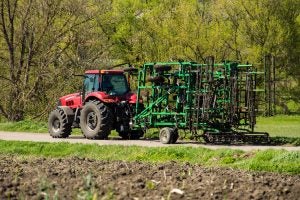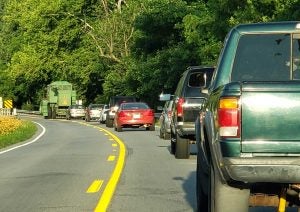Grab yourself a coffee and a notepad, and let’s talk.
Let’s discuss a farmer’s least favorite things: insurance and paperwork. If you’re anything like the typical farmer, the last thing you ever want to do is sit at the kitchen table doing paperwork — talking about things that may or may not happen. Then figuring out what to insure and what not to insure. Your future could depend on it.
Accidents happen and we’re in a sue-happy society. People want things, whether they earn them or not. Make sure you aren’t going to give them your hard work because you didn’t want to have the conversation.
Some situations are unavoidable, and we want to make sure we do everything we can to protect ourselves.
Things to ask yourself and your insurance agent, lawyer, or law enforcement (maybe ask them all and see the different responses you get):
- If I must take farm equipment on the highway, what do I need on that equipment to make it legal? (e.g. slow moving signs, flashing lights, wide load sign)
- Do I need to have a “pilot” vehicle? One in front and one behind? Only one in front? Only one behind?
- Does it have to be in daylight hours? What is considered daylight hours?
- What if I have to move after dark?
- What is legal to take on a highway and what isn’t?
- Are there different rules for state highways versus interstates?
- What if an accident does occur? What needs to happen immediately after it?
- Do I need extra insurance if I move equipment on the highway or does my regular insurance cover it?
Obviously, we want to avoid moving equipment on highways if possible, but sometimes that just isn’t possible when you have a field with the only entrance on a highway. Accidents can happen anywhere, and while the questions were directed to highways, somebody can rear end you or run into you on a gravel road. The questions are still applicable.

We see it happening more and more often as people get busier and busier. Farm equipment getting hit. People passing when it’s not safe. People not giving enough space and hitting the side of equipment. Even in big trucks that go the speed limit, people want to go faster. They pass, cut right back in front of you and immediately brake to turn.
While it’s a great idea to educate and share how long it takes to stop with a loaded truck, it’s equally important to make sure you’re covered. We’ve all seen videos taken from dash cams. Maybe there needs to be a conversation about having one for your farm equipment.
Most of the time it isn’t the farmer that causes the accident. That doesn’t mean we don’t have liability by driving on the highway, but it’s normally because people aren’t paying attention.
My uncle was taking his field cultivator up the highway and was rear ended by a van. It’s been several years now, but the litigation is still on going. Everything that happens right away is very important. Things are going to be cleaned up and the only thing left to go on is what the reports say.
It’s important that everybody is all right, but it’s equally important to make sure you give as many details as you possibly can. Make sure that you read what they ask you to sign. Make sure they didn’t leave any of your statement out. Give every single detail.
The more time that passes after an accident and once other people become involved, the more complicated it gets. You need to make sure you have done everything possible to protect yourself and your farm.

I know it’s not a fun conversation. I know you have a billion and four other things to do to keep your farm operational, but none of those things are going to matter if somebody takes your farm from you.
Another thing to consider is having a relationship with a lawyer already established. I know none of us care to think about needing one, but having one in your arsenal wouldn’t be a bad idea. The last thing you want to do in that situation is scramble to try finding a good lawyer. You have relationships with insurance agents, agronomists, nutritionists, veterinarians, etc. Having a lawyer added to that list probably would’t be a bad thing.
Finish your cup of coffee while setting up appointments with your insurance agent, law enforcement, and lawyer. Schedule it for a rainy day and make a day date out of it — especially if you’re sick of being stuck in the shop all day.
Do this and protect yourself for you and for future generations.
Kelsey Pagel is a Kansas farmer. She grew up on a cow/calf and row crop operation and married into another. Kelsey and her Forever (Matt) farm and ranch with his family where they are living their dream and loving most of the moments.



